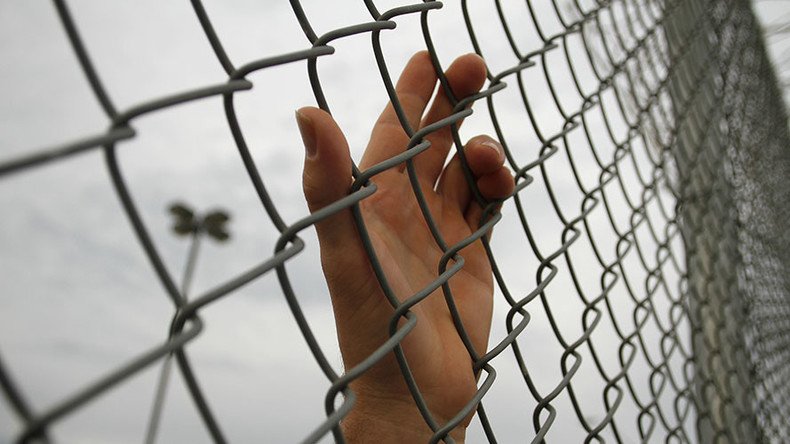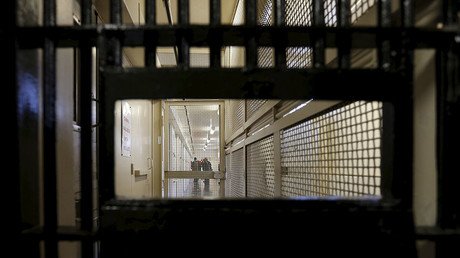DHS to review private immigration detention facilities, consider closures

The US may soon curtail the use of privately-owned immigration detention centers as the Department of Homeland Security’s head has ordered closer scrutiny. The move would reflect the Justice Department’s step to phase out private prisons.
“On Friday, I directed our Homeland Security Advisory Council [HSAC], chaired by Judge William Webster, to evaluate whether the immigration detention operations conducted by Immigration and Customs Enforcement [ICE] should move in the same direction,” DHS Secretary Jeh Johnson said on Monday.
Judge Webster’s team would have until November 30 to complete the evaluation of immigration detention centers across the US and present the results personally to Johnson and the director of Immigration and Customs Enforcement, Sarah Saldana.
Johnson has also tasked Judge Webster with starting a Subcommittee of the Council that would look into America’s existing policy and practices of using privately owned centers. It would be on the Subcommittee to judge whether this should be changed as well.
“I asked that the Subcommittee consider all factors concerning ICE’s detention policy and practice, including fiscal considerations,” Johnson said.
According to the Center for American Progress, over 60 percent of all immigration detention beds across the US are currently operated by for-profit prison corporations, compared to 25 percent in 2005. The two major contract holders are Corrections Corporation of America (CCA) and Geo Group Inc.
For example, CCA still has its lucrative $1 billion deal the Obama administration inked in 2014. The US government even bypassed public bidding laws to have CCA start up and run a detention facility at the South Texas Family Residential Center for women and children.
In the past decade, both CCA and Geo Group have doubled their revenues. The Center for American Progress said ICE contracts alone accounted for less than 10 percent of CCA’s total revenue in fiscal year 2005 ($95 million), compared to 13 percent in FY 2014 ($221 million). In the case of Geo Group, US government contracts made up 27 percent of its revenues in FY 2005, with ICE accounting for 5.5 percent ($33.6 million). Nearly 10 years on, federal contracts increased to 42 percent of Geo Group revenue, with ICE accounting for 15.6 percent.
Johnson’s statement has been welcomed by Democrats, who have long been protesting the government inking contracts with private prison companies.
“The Department of Homeland Security should follow the lead of the Department of Justice and phase out for-profit, privately run immigration detention facilities," Senator Bernie Sanders of Vermont said. "These private prisons cost more and are less humane.”
In September, Sanders, who lost a Democratic presidential bid to Hillary Clinton this year, introduced what he called the “Justice is not for sale” bill, calling the DHS to end immigration family detention. He specifically referred to facilities in Texas and Pennsylvania owned and operated by private prison companies.
Immigration agents used ‘deceptive’ tactics to detain 120+ women and children – lawsuit https://t.co/RCfuK50Al1pic.twitter.com/EIZSXACnYJ
— RT America (@RT_America) August 10, 2016
Sanders’ bill also proposed inspecting facilities by both the secretary of homeland security “at least annually” and by “an independent, third party auditor at least biannually” in order to ensure “humane treatment of detainees” there.
Rep. Raúl M. Grijalva (D-Arizona), who supported Sanders’ bill, has also applauded the DHS’ move.
“I am glad the Department of Homeland Security is reviewing its reliance on the for-profit prison industry to detain immigrants to our country,” the liberal lawmaker said. “DOJ’s announcement […] that it would cut ties with incarceration profiteers was welcome, but long overdue. I hope that DHS’s review is a signal that they will follow suit.”
Justice Department to phase out private prisons citing safety concerns https://t.co/f8TyyhQJcWpic.twitter.com/UWUtuPd0PQ
— RT (@RT_com) August 19, 2016
According to US Customs and Border Protection data, 27,754 unaccompanied children were taken into custody by officials between October 2015 and March 2016, representing a 78 percent increase from the prior year.
On August 18, the DOJ announced it would reduce and ultimately end the use of privately operated prisons. The US government is not going to renew contracts it has with 14 private prisons, while existing contracts will be allowed to expire over the next five years.













